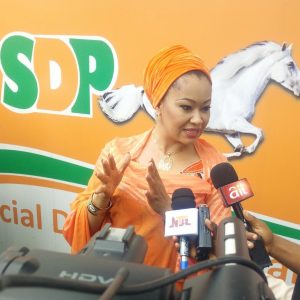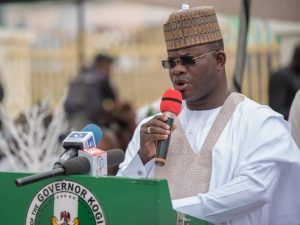The dynamics in and around Kogi State appears to be confirming fears that tomorrow’s gubernatorial election in the state cannot but be violent. Aside from the fears that a keen observer such as the Centre for Democracy and Development, (CDD) – (CDD Calls for Extra Measures By INEC, Police in Kogi Guber Poll) – has expressed at a news conference yesterday, some armed and masked men who appeared in police uniforms are understood to have launched an attack on the hotel where the Chairman of the Peoples Democratic Party, (PDP)’s Kogi State Campaign Council and governor of Oyo State, Engineer Seyi Makinde, lodged in Lokoja, the state on late Friday morning. Makinde is in Kogi State in his capacity as the Chairman of that council.
Information which though came solely from Governor Makinde’s side at the time of reporting suggests that the hooded policemen came in about 100 vehicles and were led by the officer-in-charge of one of the Arms of the Nigerian Police Force in Kogi State.
There was said to be commotion as security operatives attached to the governor and some residents of nearby buildings resisted the attackers who attempted gaining entrance into Suitorial Hotel along Stadium Road where the governor and some members of the PDP Campaign Council were lodged.
If this were to turn out to be completely true, then it confirms the fears expressed by different observers and actors in Nigerian politics so far. Who wins is not what people are worried about but how the winner might have emerged or whether the election can be violence free.

Barr Akpoti riding into town on the stallion
Aside from CDD’s contextual analysis that political actors have set the stage for what could be a very bloody electoral process “if urgent action is not taken to address the situation”, Kogi State and its politics is a violence prone site. Politics is largely imagined along a zero-sum game between two dominant ethnic groups. CDD added a dimension that has not been reckoned with before by asserting that there is an obvious targeting of Natasha Akpoti, the governorship candidate of the Social Democratic Party, (SDP), whose State Secretariat was recently razed. CDD’s argument is that such is capable of discouraging marginalised groups, especially women from participating in the political process and particularly from contesting for political office.
The implication is that physical and structural violence are already going on simultaneously. What would be the reason for thinking it would not be worse tomorrow?
Intervention is in receipt of criticism of the CDD position, with a critic saying that CDD scholars have fallen into the herds mentality in analysing electoral contest in Nigeria and that, with due deference to Prof. Adele Jinadu, “this particular CDD statement looks like “cut and paste” … of the received theoretical framework of the funders”, others note that CDD is not saying anything fundamentally different from the election management body – INEC and the Police. Both are scared that thugs imported from neighboring states could be a factor in the contest. So, who is who in this zero-sum game for which some candidates might import thugs and thuggery?
Central to the feared scenario is the incumbent governor of the state, Alhaji Yahya Bello. As incumbent, he is theoretically privileged but appears empirically famished. That, says observers, makes him a challenged incumbent and who could rely on thugs to get things done. Performance is, like beauty, in the eye of the beholder. But, in his own case, there is some consensus that he has not brought polish and candour to exercise of power. The supplication of some fellow governors on his behalf for him to be given a second chance confirms this assessment of his chances.

Gov Yahaya Bello, an embattled incumbent
His problems appear compounded by the candidature of Natasha Akpoti, the governorship candidate of the Social Democratic Party, (SDP) who seems to have been at the worst end of thuggery so far with the razing of the State Secretariat of the party. Akpoti is not just educationally solid, with a Masters Degree in Petroleum Policy from the University of Aberdeen, she is said to be sharp and determined and she is not poor. But, more importantly, she is also popular through her NGO outreach, with good control of women voters. She has structures, politically speaking and she is, above all, from Kogi Central where the governor also comes from. This, argues those who are conversant with Kogi politics, is why she has been the subject of thuggish attacks. It is understood that the violent attacks on her party secretariat came after a court action to stop her failed. That is to say she is feared with her combination of knowledge, relative wealth and electoral assets.

Musa Wada, the most highly connected of the trio
The last force is the PDP factor, symbolised by the party’s governorship candidate, Engineer Musa Wada. Wada has resources, Intervention was told. He also comes from one of the most populated axis in the state – Dekina/Ayigba. His candidature sends fears to his competitors when it comes to the wired nature of his person. He is an in-law to a former governor of the state and junior brother to another former governor of the state. Although a son of his in-law contested for the PDP ticket with him as well as his senior brother, it is now a family affair as all of them are understood to be united with him.
At the news conference under reference Thursday in Abuja by Professor Adele Jinadu and Ms Idayat Hassan in which the CDD provided elaborate details of its own election monitoring process, the think tank indicated it would not mind if INEC considers making special arrangements, including hiring security if there are gaps in providing cover from the usual channels, saying that if the recent history of electoral violence targeting INEC in Kogi State is anything to go by, clear preventive and contingency plans by INEC is an imperative.
Recalling the razing of INEC Office in Dekina LGA in December 2015 during the governorship election in what was suspected to be an attack by thugs working for some partisan interests, CDD opines that the risk of violence must be proactively and decisively addressed or could have severe consequences for the smooth conduct and, ultimately, the credibility of the election.
INEC is projecting voting taking place in 3,508 polling units across 239 wards in 21 Local Government Areas (LGAs) in Kogi State, with assurances of leaving no stone unturned towards delivering a credible poll but CDD is also saying INEC has already raised “warning signals” on the possibility of thugs mobilised by political actors disrupting the conduct of the elections as have happened previously.

The Centre for Democracy and Development, (CDD)
It is equally pressing for the Police to go beyond deployment of 35, 000 officers to guaranteeing the neutrality and the level of professionalism by the police personnel on the ground, saying experience in previous elections, including the 2019 general elections, had shown that, without adequate oversight, the security agencies could forget their responsibilities and begin to act in connivance with partisan interests to subvert the electoral process. CDD is not leaving out the civil society organisations and media, asking them to remain vigilant and observe all deployment processes, monitor all aspects of the polling from opening to the collation phases without partisanship.
CDD insists it has received widespread reports of politicians inducing voters with cash, gift items and food. Reports indicate this anomaly has been observed to be at a very high level in Ankpa, Okehi and Lokoja. And calls on the electorate to shun political actors attempting to induce them to trade away their votes. It declares its support for firming up the mooted collaboration between INEC and the anti-graft agencies, the Economic and Financial Crimes Commission (EFCC) and the Independent Corrupt Practices and Other Related Offences Commission (ICPC) to identifying and arresting perpetrators where the electoral process continues to grapple with the severe challenge posed by vote-buying.




























